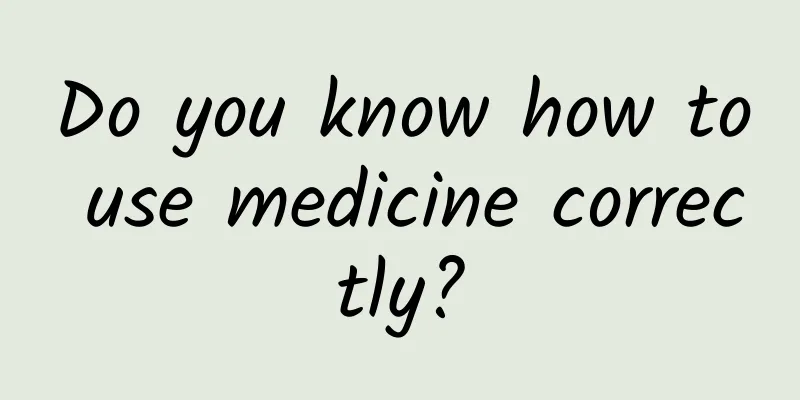Do you know how to use medicine correctly?

|
Do you know how to use medicine correctly? Author: Julie, outpatient department of Shanghai Sixth People's Hospital Medicine can cure diseases, but it can also cause them. Improper use of medicines can bring great risks to our health, affecting drug absorption and reducing efficacy, or worse, aggravating adverse reactions and even endangering life. 1. When is the best time to take the medicine? Fasting: 1 hour before or 2 hours after a meal. Three times a day: once every 8 hours. Take before meals: 30 to 60 minutes before meals. Take with food: Take with the first bite of food or immediately after a meal. After meals: 30 minutes to 1 hour after meals. Take before bed: 30 minutes before bedtime. 2. What should not be consumed while taking medicine? Alcohol: Taking it with cephalosporins can cause dizziness, difficulty breathing, and even be life-threatening. Milk: It will reduce the activity of antibiotics. Fruit juice: The rich fruit acid will accelerate the dissolution of antibiotics, which will not only reduce the efficacy but also may produce harmful intermediates and increase toxic side effects. Coffee: Caffeine will stimulate the gastric mucosa to secrete gastric acid. Taking it together with antipyretic and analgesic drugs will enhance the irritation of the gastric mucosa. In severe cases, there is a risk of gastric bleeding and perforation. Tea: Tea contains ingredients such as theophylline tannic acid, which can react with drugs and affect drug absorption and efficacy. ★The safest water to use when taking medicine is: warm boiled water. 3. How to store medicines properly 1. If the medicine is not stored properly, the active ingredients in it will lose their original effects. Light, temperature and humidity will all have an impact. Normal temperature: a place where the temperature is between 10~30℃. Cool place: where the temperature does not exceed 20℃. Shade place: A place where the temperature does not exceed 20℃ and is away from light. Refrigeration: Place in the refrigerator at a temperature between 2 and 10°C. 2. Shading and light avoidance: Light-shielding: These medicines need to be stored in light-proof brown containers or wrapped in black material and kept out of direct sunlight. Avoid light: This type of medicine has slightly lower requirements for light and only needs to be placed in a place without direct sunlight. 3. How to distinguish between using with caution, avoiding use, and prohibiting use Use with caution: After weighing the pros and cons of the side effects of the drug and the therapeutic effects, use it with caution, but the patient's medication must be closely observed. If any adverse reactions occur, stop the drug immediately. Contraindications: The drug is not suitable for use or should be avoided. Prohibited: Absolutely prohibited. Can the medicine be broken up and taken? The pills are too big to take in pieces? The following medicines are not suitable! Enteric-coated tablets: refers to a type of tablet that does not disintegrate in gastric juice but can disintegrate and be absorbed in intestinal juice. It is usually coated with an enteric coating on the outside of ordinary tablets. If this type of medicine is taken separately, it will not only affect the efficacy of the medicine, but also cause adverse reactions such as nausea and stomach pain. Sustained-release tablets/controlled-release tablets: refers to tablets that slowly release drugs at a non-constant rate in a specified release medium. Unless the instructions indicate that they can be broken into pieces, they should generally be swallowed whole. These drugs need to maintain a stable level in the body and slowly decompose to take effect. If these drugs are broken into pieces and taken, the level in the body cannot be maintained stably. Capsules: Do not break them open and swallow them directly. Because the function of the capsule shell is: Isolate the bad smell or bitter taste of the medicine itself. Avoid direct contact of the drug with the esophagus or stomach that may cause damage. Avoid abnormal drug effects. Do you remember the above tips on medication? Be sure to use medication safely and effectively under the guidance of a doctor or pharmacist! (All pictures in the article are taken from the Internet) |
>>: 2 little habits that hurt your eyes, you do them every day
Recommend
What are the treatments for pregnancy preservation?
Many pregnant friends do not actually know how to...
Can breast hyperplasia be treated with electric energy?
For diseases such as breast hyperplasia, patients...
Right fallopian tube pain during ovulation
During a woman's ovulation period, the sudden...
Is it harmful to bend over during early pregnancy?
It is not recommended to bend over too much in th...
How to nourish the liver in daily life?
In daily life, some behaviors may cause damage to...
Location of pubic lymph nodes
Although the private area is prone to disease, so...
A connection that shouldn't happen directly: cerebral vascular malformation
Author: Wang Shuo, Chief Physician, Beijing Tiant...
Is Breast Sag Correction Effective?
Many new mothers have reported that their breasts...
How many days is the normal menstrual period delayed?
For some female friends, their menstruation may b...
Things women often do, don't blush after reading this
1. Wearing a few hundred dollars of high-end lips...
Four steps in the abortion process
Many women are unwilling to face an unexpected pr...
Acid reflux and burning throat in late pregnancy
The changes in the body's growth hormone duri...
Why are purple sweet potato buns green when steamed? Can purple sweet potatoes be eaten if they have white spots inside?
Purple sweet potatoes are rich in protein, starch...
The man was found to be driving under the influence even though he had not drunk any alcohol. It turned out that he had this bacteria in his body! The treatment method is cruel...
One late night in April 2020, in the small town o...
Why are pregnant women more likely to get syphilis?
Why are pregnant women very susceptible to syphil...









